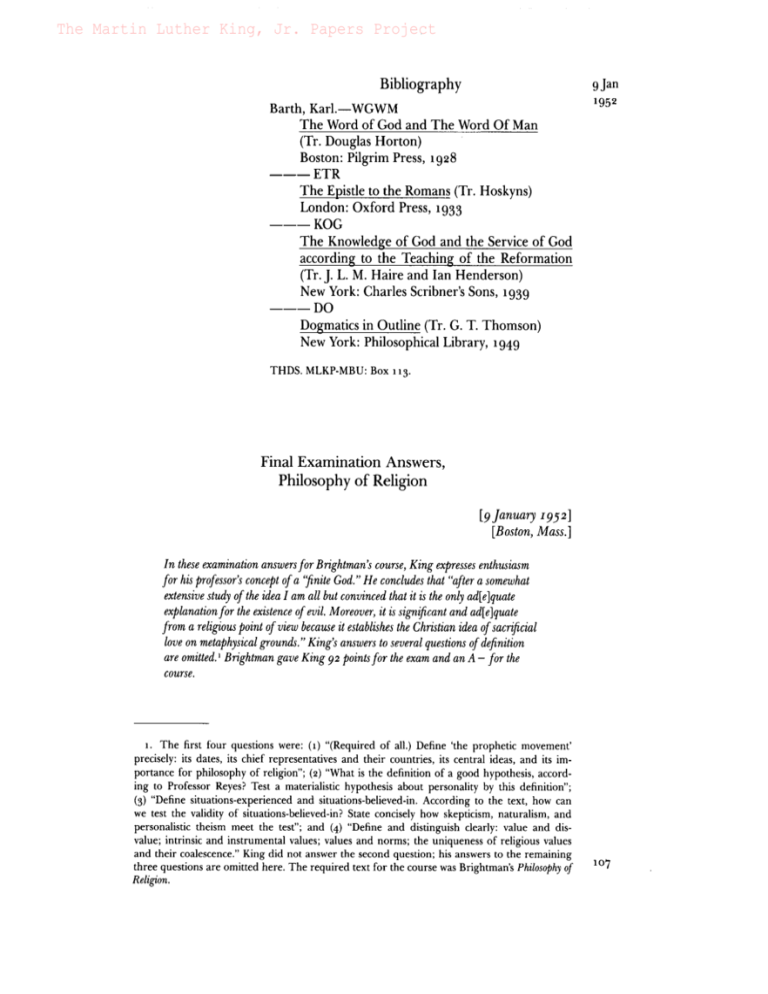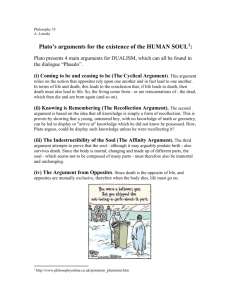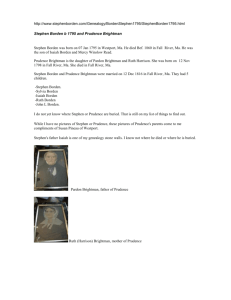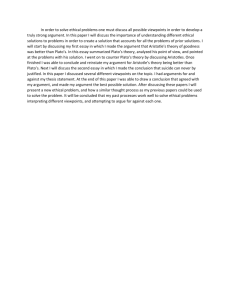Bibliography ___ ___ Final Examination Answers, Philosophy of
advertisement

The Martin Luther King, Jr. Papers Project Bibliography Barth, Karl.-WGWM The Word of God and The Word Of Man (Tr. Douglas Horton) Boston: Pilgrim Press, 1928 --- ETR The Epistle to the Romans (Tr. Hoskyns) London: Oxford Press, 1933 ___ KOG The Knowledge of God and the Service of God according to the Teaching of the Reformation (Tr. J. L. M. Haire and Ian Henderson) New York: Charles Scribner’s Sons, 1939 ___ DO Dogmatics in Outline (Tr. G. T. Thomson) New York: Philosophical Library, 1949 THDS. MLKP-MBU: Box 9 Jan ‘952 113. Final Examination Answers, Philosophy of Religion I n these examination answersfor Brightman’s course, King expresses enthusiasm for his professor’s concept of a ‘pnite God.” He concludes that “after a somewhat extensive study of the idea I am all but convinced that it is the only ad[e]quate explanationfor the existence of evil. Moreover, it is sipiJicant and ad[e]quate from a religaous point of view because it establishes the Christian idea of sacrificial love on metaphysical grounds.” King’s answers to several questions of definition are omitted. Brightman gave King 92 points for the exam and a n A - for the course. 1 . The first four questions were: ( 1 ) “(Required of all.) Define ‘the prophetic movement’ precisely: its dates, its chief representatives and their countries, its central ideas, and its importance for philosophy of religion”; (2) “What is the definition of a good hypothesis, according to Professor Reyes? Test a materialistic hypothesis about personality by this definition”; (3) “Define situations-experienced and situations-believed-in. According to the text, how can we test the validity of situations-believed-in? State concisely how skepticism, naturalism, and personalistic theism meet the test”; and (4) “Define and distinguish clearly: value and disvalue; intrinsic and instrumental values; values and norms; the uniqueness of religious values and their coalescence.” King did not answer the second question; his answers to the remaining three questions are omitted here. The required text for the course was Brightman’s Philosophy of Religion. ’O7 The Martin Luther King, Jr. Papers Project g Jan [ 5 . Define and evaluate mystical experience.] ‘952 4.* Define and evaluate mystical experience Mystical experience is immediate experience with what is believed to be the source of value. In his Giffort lectures William Janes said that the mystical experience is characterized by four traits: ( 1 ) Ineffibility (2) Noetic quality (3) transciency (4) Pas~ivity.~ These traits are accepted by most psychologists as characteristic of mystical experience. Certainly no one can doubt that the mystical experience is an important aspect of religion. But we must admit that it can be misused. Often it has been used as a means of escape from this world, moral initia, and even antin~meniasm.~ This however must not cause one to lose sight of the value of mysticism. Certainly no one can accuse many Quaker mystics of otherworliness and lack of social concern. One needs only know of their stand against slavery, poverty and war.5 The mystical experience when rightly used can be an important and meaningful aspect in the life of any one. When misused it can be an injurious force. To say that the mystical experience is unreal and of no value, as Professor Leuba intimated, because similar experience can come from the use of drugs is tantamount to denying the reality of the external world because some peapk people have hallucinations.6 [6. W h a t is treated in the text as the chief argument f o r immortality? Evaluate it, treating also one other argument that you regard as important either f o r or against the belief.] 5. T h e chief argument for immortality treated in the text is that of the goodness of God.’ The argument goes that if God is a good God and the cosmic axiogenetic and axiosoteric power, then he will conserve persons who are of supreme value. God the conserver k of values must be God the conserver of persons. I feel that this is the only argument that can be set forth for immortality with any weight. Certainly it is coherent. Any argument for God must at the same time be an argument for immortality. 108 2. Brightman had crossed out the “2” next to King’s second answer (to question 3) and written, “Use numbers found on exam sheet.” He similarly corrected the subsequent numbering (3-6 to 4-7). 3. Brightman corrected “Giffort” to “Gifford” and “Janes” to “James.” He also underlined “transciency”twice and wrote a question mark next to it. This list of traits is from Brightman, Philosophy of Religion, p. 69. 4. Brightman corrected “initia”to “inertia.” 5. Brightman wrote in the margin: “Not the great mystical &.” 6. This argument by James Henry Leuba (1868-1946) is cited in Brightman, Philosophy of Religion, p. 70. 7. Brightman underlined “goodness of God” and wrote, “Value of personality.” The Martin Luther King, Jr. Papers Project T h e most important argument against immortality is that set forth by the materaistic interpretation of phdesep physiological psychology. This argument states that there is an inseperable relationship between brain and consciousness. So that without the nervous system or the brain &e human consciousness cannot exist. This argument however, may be refuted by a personalistic on the grounds that the body including the brain and nervous system are phenomenal occasions of the divine energizing. g Jan 1952 [7. Define the ‘Ifinite God” as treated in this course. Criticize the idea; gzue your present evaluation, both on philosophical and on religzous grounds.] 6. Define the “finite God” as treated in this course. The argument for the “finite God” goes as follows: God is a f x m w k m e conscious Person of eternal duration. He eternally finds and controls the Given in every moment of his experience. T h e Given consist of eternal uncreated laws of reason and equally eternal uncreated processes of nonrational consciousness. His will did not create the Given but it is in his experience at every moment. This view may be compared to that of Plato. There were three factors in Plato’s universe ( 1 ) God (the Demiurge) (2) the Pattern (the eternal Ideal) and (3) the Receptacle (the chaos of space). The world came into existence through the interaction of the Pattern with the Receptacle. Plato’s Patterns is similar to what Brightman calls the formal aspect of the Given. T h e Receptacle is similar to what he calls the content aspect of the Given. There is one important difference, however, between Plato and Brightman at this point. For Plato the Pattern and the Receptacle are external to God. For Brightman the Given is within God.8 It is significant to note that Brightman never limits God’s ethical nature. God’s power is finite, but his goodness is infinite. At present I am quite sympathetic with this idea. After a somewhat extensive study of the idea I am all but convinced that it is the only adaquate explanation for the existence of evil. Moreover, it is significant and adaquate from a religious point of view because it establishes the Christian idea of sacrificial love on metaphysical grounds. It is the most empirical explanation that we can set forth in relation to the God idea. It makes a thorough distinction between good and evil, given an explanation for the existence of both. This theistic absolutetism fails to AHDS. MLKP-MBU: Box 115. 8. Brightman underlined this sentence and wrote, “Very important.” 9. Brightman wrote at the end of this paragraph, “Good analysis.” ‘09






